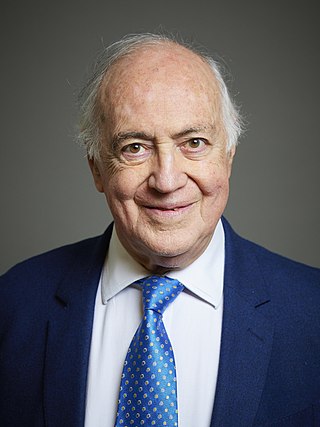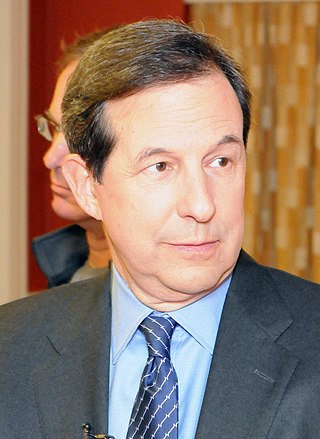Related Research Articles
A loaded question is a form of complex question that contains a controversial assumption.
In classical rhetoric and logic, begging the question or assuming the conclusion is an informal fallacy that occurs when an argument's premises assume the truth of the conclusion. Historically, begging the question refers to a fault in a dialectical argument in which the speaker assumes some premise that has not been demonstrated to be true. In modern usage it has come to refer to an argument in which the premises assume the conclusion without supporting it. This makes it more or less synonymous with circular reasoning.

Jeremy Dickson Paxman is an English retired broadcaster, journalist, author, and television presenter. Born in Leeds, Paxman was educated at Malvern College and St Catharine's College, Cambridge, where he edited the undergraduate newspaper Varsity. At Cambridge, he was a member of a Labour Party club and described himself as a socialist, in later life describing himself as a one-nation conservative. He joined the BBC in 1972, initially at BBC Radio Brighton, relocating to London in 1977. In following years, he worked on Tonight and Panorama, becoming a newsreader for the BBC Six O'Clock News and later a presenter on Breakfast Time and University Challenge.

Michael Howard, Baron Howard of Lympne is a British politician who served as Leader of the Conservative Party and Leader of the Opposition from November 2003 to December 2005. He previously held cabinet positions in the governments of Margaret Thatcher and John Major, including Secretary of State for Employment, Secretary of State for the Environment and Home Secretary.

Newsnight is the BBC's news and current affairs programme, providing in-depth investigation and analysis of the stories behind the day's headlines. The programme is broadcast on weekdays at 22:30 on BBC Two and the UK feed of BBC News channel; it is also available on BBC iPlayer.

Clever Hans was a horse that was claimed to have performed arithmetic and other intellectual tasks. After a formal investigation in 1907, psychologist Oskar Pfungst demonstrated that the horse was not actually performing these mental tasks, but was watching the reactions of his trainer. He discovered this artifact in the research methodology, wherein the horse was responding directly to involuntary cues in the body language of the human trainer, who was entirely unaware that he was providing such cues. In honour of Pfungst's study, the anomalous artifact has since been referred to as the Clever Hans effect and has continued to be important knowledge in the observer-expectancy effect and later studies in animal cognition. Pfungst was an assistant to German philosopher and psychologist Carl Stumpf, who incorporated the experience with Hans into his further work on animal psychology and his ideas on phenomenology.
A complex question, trick question, multiple question, fallacy of presupposition, or plurium interrogationum is a question that has a complex presupposition. The presupposition is a proposition that is presumed to be acceptable to the respondent when the question is asked. The respondent becomes committed to this proposition when they give any direct answer. When a presupposition includes an admission of wrongdoing, it is called a "loaded question" and is a form of entrapment in legal trials or debates. The presupposition is called "complex" if it is a conjunctive proposition, a disjunctive proposition, or a conditional proposition. It could also be another type of proposition that contains some logical connective in a way that makes it have several parts that are component propositions.

Response bias is a general term for a wide range of tendencies for participants to respond inaccurately or falsely to questions. These biases are prevalent in research involving participant self-report, such as structured interviews or surveys. Response biases can have a large impact on the validity of questionnaires or surveys.

Christopher Wallace is an American broadcast journalist. He is known for his tough and wide-ranging interviews, for which he is often compared to his father, 60 Minutes journalist Mike Wallace. Over his 50-year career in journalism he has been a correspondent, moderator, or anchor on CBS, ABC, NBC, Fox News, and now CNN. In 2018 he was ranked one of America's most trusted TV news anchors. Wallace has won three Emmy Awards, a Peabody Award, a George Polk Award, the duPont-Columbia University Silver Baton Award, and a Paul White lifetime achievement award.
Informal fallacies are a type of incorrect argument in natural language. The source of the error is not just due to the form of the argument, as is the case for formal fallacies, but can also be due to their content and context. Fallacies, despite being incorrect, usually appear to be correct and thereby can seduce people into accepting and using them. These misleading appearances are often connected to various aspects of natural language, such as ambiguous or vague expressions, or the assumption of implicit premises instead of making them explicit.
In social science research, social-desirability bias is a type of response bias that is the tendency of survey respondents to answer questions in a manner that will be viewed favorably by others. It can take the form of over-reporting "good behavior" or under-reporting "bad", or undesirable behavior. The tendency poses a serious problem with conducting research with self-reports. This bias interferes with the interpretation of average tendencies as well as individual differences.

The Andrew Marr Show is a Sunday morning talk show presented by Andrew Marr. It was broadcast on BBC One from 2005 to 2021.
The Metallic Metals Act was a fictional piece of legislation included in a 1947 American opinion survey conducted by Sam Gill and published in the March 14, 1947, issue of Tide magazine. When given four possible replies, 70% of respondents claimed to have an opinion on the act. It has become a classic example of the risks of meaningless responses to closed-ended questions and prompted the study of the pseudo-opinion phenomenon.
Mental reservation is an ethical theory and a doctrine in moral theology that recognizes the "lie of necessity", and holds that when there is a conflict between justice and veracity, it is justice that should prevail. The doctrine is a special branch of casuistry developed in the late Middle Ages and the Renaissance. While associated with the Jesuits, it did not originate with them. It is a theory debated by moral theologians, but not part of Canon law.
Bronston v. United States, 409 U.S. 352 (1973), is a seminal United States Supreme Court decision strictly construing the federal perjury statute. Chief Justice Warren Burger wrote for a unanimous Court that responses to questions made under oath that relayed truthful information in and of themselves but were intended to mislead or evade the examiner could not be prosecuted. Instead, the criminal-justice system had to rely on more carefully worded follow-up questions.
Derek Lewis is a former Director General of HM Prison Service, who was sacked in 1995 by then Home Secretary Michael Howard after a series of high-profile escapes by IRA prisoners. He had declined to suspend the governor of Parkhurst Prison after a mass escape, and alleged that Howard had threatened to overrule him to force the suspension. Howard denied that he had done so. During the 1997 Conservative Leadership contest, Jeremy Paxman asked Howard whether he had threatened to overrule Lewis. The question was put 12 times with Howard failing to give a definitive answer.

Army Field Manual 2 22.3, or FM 2-22.3, Human Intelligence Collector Operations, was issued by the Department of the Army on September 6, 2006. The manual gives instructions on a range of issues, such as the structure, planning and management of human intelligence operations, the debriefing of soldiers, and the analysis of known relationships and map data. The largest and most newsworthy section of the document details procedures for the screening and interrogation of prisoners of war and unlawful combatants.
Othello error occurs when a suspicious observer discounts cues of truthfulness. Essentially the Othello error occurs, Paul Ekman states, "when the lie catcher fails to consider that a truthful person who is under stress may appear to be lying," their non-verbal signals expressing their worry at the possibility of being disbelieved. A lie-detector or polygraph may be deceived in the same way by misinterpreting nervous signals from a truthful person. The error is named after William Shakespeare's tragic play Othello; the dynamics between the two main characters, Othello and Desdemona, are a particularly well-known example of the error in practice.

Brain Electrical Oscillation Signature Profiling is an EEG technique by which a suspect's participation in a crime is detected by eliciting electrophysiological impulses.

Trump: The Kremlin Candidate? is a documentary film first broadcast by the program Panorama on BBC One, and first aired in the United Kingdom on 16 January 2017, four days before the Inauguration of Donald Trump. It examined links between Trump associates and Russian officials and spies and the relationship between Vladimir Putin and Donald Trump. It features investigative journalist John Sweeney, who journeyed to Russia, Ukraine, Lithuania, and the United States during the course of his research. Sweeney had prior experience on the subject matter, having interviewed Trump in 2013, and Putin in 2014. The film was directed by Matthew Hill, Tomiko Newson, and Nick Sturdee.
References
- ↑ "Why Dodging the Question Works in Debates (and Job Interviews)". BNET. 2008-10-07.
- ↑ "When Paxman grilled Howard". www.bbc.com. BBC News. Retrieved 28 September 2023.
- ↑ Webb, Alban. "The Interview". www.bbc.com. BBC. Retrieved 28 September 2023.
- ↑ Engel, S. Morris; Soldan (October 2007). The Study of Philosophy. Rowman & Littlefield. p. 135. ISBN 978-0-7425-4892-3 . Retrieved 2010-11-17.
- ↑ Luxmoore, Matthew (15 June 2021). "Putin Revels in U.S. TV Interviews, but His Target Audience May be in Russia". Radio Free Europe/Radio Liberty.
- ↑ Bull, Peter (1 December 2008). ""Slipperiness, Evasion, and Ambiguity": Equivocation and Facework in Noncommittal Political Discourse". Journal of Language and Social Psychology. 27 (4): 333–344. doi:10.1177/0261927X08322475. ISSN 0261-927X. S2CID 145658555.
- ↑ Bull, Peter (2003). The Microanalysis of Political Communication. doi:10.4324/9780203417843. ISBN 9780203417843.